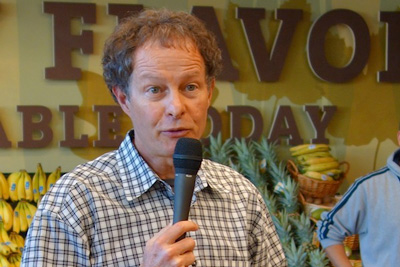

By Corie Brown
"People have the right to know what is in their food," Whole Foods Market founder and co-CEO John Mackey told a gathering of customers at his company's Pasadena store. And when it comes to eating genetically modified anything, he said, the folks who shop at Whole Foods have made it clear: "They don't want it," he says.
Mackey listens to his customers. Last week Whole Foods announced that, within five years, all genetically modified ingredients for sale in its stores will be labeled. He is the first retailer in the U.S. to take this step; the story ran on the front page of the New York Times.
In the battle over the American shopper, Mackey, a baby boomer vegan from Austin, Texas, has called out the big boys of GMOs -- Monsanto, Archer Daniels Midland, Cargill and other multinational chemical companies. If they want access to his customers, they'll have to play by his rules.
"It's not going to be easy," Mackey told the group in Pasadena in February, smiling as he shifted his thin frame from one desert boot to the other. "But if the government won't act, we will."
Most of the corn and soybeans grown today in the United States is genetically altered, as is a growing list of fresh produce sold in neighborhood grocery stores. And while Mackey has 339 Whole Foods stores in the U.S. and Canada, he's a junior varsity player in the North American grocery business. The Grocery Manufacturers Assn., a trade group representing major food companies and retailers, wasted now time in denouncing his GMO labeling decision.
But Mackey's 30-plus years of paying extraordinary attention to his customers' wants and needs have earned him a fierce loyalty that allows him to punch well above his weight. No one is counting him out in this fight.
It was Mackey's business philosophy that took me to Pasadena last month to hear him speak during a stop on the promotional tour for "Conscious Capitalism: Liberating the Heroic Spirit of Business," a new business management book he co-wrote with Raj Sisodia, a Bentley College marketing professor.
"I believe capitalism is the greatest force for good in the world. It alleviates poverty, creates goods and services and allows the culture to advance," Mackey said in his opening remarks. His goal in writing the book was to help companies claim an individual sense of purpose, something he believes many businesses lose in the struggle to survive.
If the only goal of a business is to make money, he says, it will fail to reach its potential. In the book, Mackey writes, "Conscious businesses treat satisfying the needs of all their major stakeholders as ends in themselves, while traditional businesses often treat stakeholders other than investors as the means to achieving their ultimate goal of profit maximization."
Doing it right starts by establishing a "core value" to guide your business, he says. At Whole Foods, it is to be a financially successful retailer providing customers high quality whole, organic products.
With its core value in mind, a conscious business then considers the needs of all of its stakeholders. Meeting the needs of the customers is first and foremost, but it extends to the needs of employees, suppliers, investors, the communities around stores and the environment as a whole. When a company gets the balance right, it can improve the lives of all stakeholders.
Viewing his decision on GMO labels through that prism, Mackey didn't have much choice. His key stakeholders -- his customers -- made it clear that they wanted to avoid GMOs. But he took his suppliers' needs into account as well. Rather than force them to immediately comply with Whole Foods' new requirement, he gave them time to secure non-GMO ingredients or to accept the effect of being labeled accordingly.
Mackey has made similar moves at the Whole Foods meat and fish counters. Some customers won't eat anything but grass-fed beef. Others think conventionally raised beef is just fine. Which fish are sustainably caught or raised? The labels tell the story. And while the effort is at best a work-in-progress, he is setting a standard that other grocery stores are struggling to match.
It's all a process, he says. A "conscious business" gradually becomes more and more aware of its "reason for being," or its core value. Enlightenment, wisdom and all of the higher thinking implied in those words, he says, gets easier with experience.
Conscious capitalism "is about leadership that serves the higher good of the organization, a culture that helps humans to flourish and self-actualize themselves.
"We are not retailers with a mission as much as missionaries who retail," he wrote in the book. And his mission is to spread the gospel of conscious capitalism and change the world for better, forever. An optimist, Mackey believes any company can be saved. Maybe even GMO giant Monsanto.
Top photo: Whole Foods' John Mackey in Pasadena. Credit: Chris Fager
Corie Brown, the co-founder and general manager of Zester Daily, is an award-winning food writer at work on a book about climate change and wine.
More on Zester Daily: